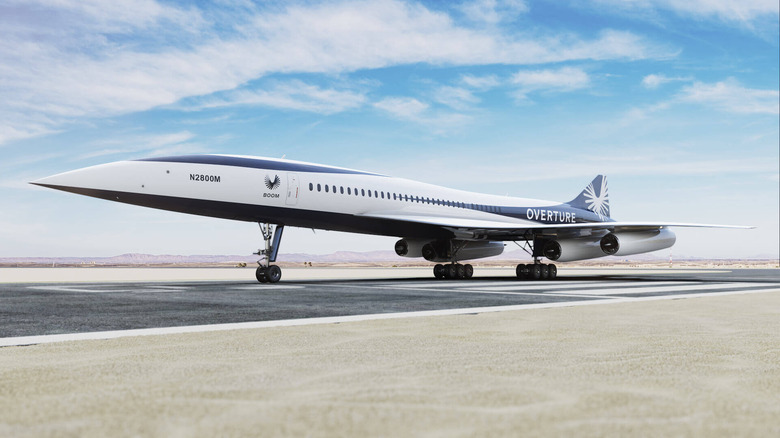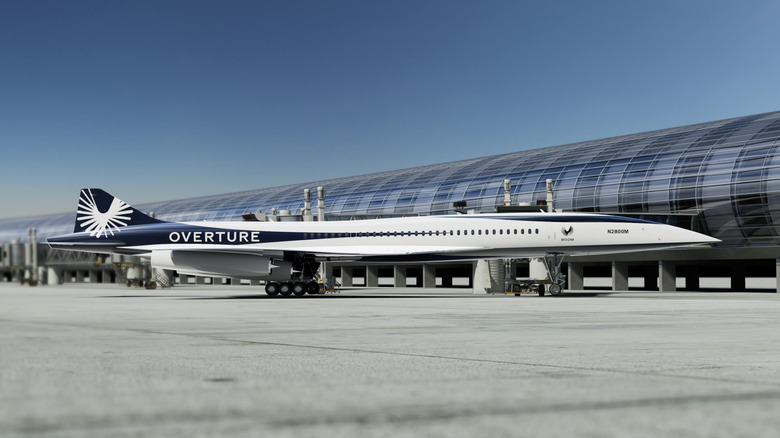While Boom Supersonic boasted about there being no audible sonic boom on the ground during the final test flight of its XB-1 demonstrator in February, its prospective airliner still isn’t allowed to break the sound barrier over the United States. Senator Ted Budd introduced a bill last week to lift the ban on civil supersonic flights. It probably won’t surprise you that Budd represents North Carolina, where Boom will build its Overture airliners. However, it still hasn’t been proven that the “Boomless Cruise” implementation on the XB-1 will translate to the full-scale Overture.
On the one-third-scale XB-1, the upstart plane manufacturer utilized the Mach cutoff, a studied physics phenomenon where sound waves refract off the atmosphere. Boom touted this increased speed envelope as ‘Boomless Cruise.” The feature is so enticing that it would leave any airline executive weak at the knees. While the first Overture hasn’t rolled out of the factory yet, United Airlines and American Airlines have already ordered a combined 35 planes with options for 75 more.
A fabricated supersonic war with China
Budd’s bill is exceptionally brief, only one and a half pages long. The Supersonic Aviation Modernization Act, or SAM Act, tasks the FAA with revising federal regulations within a year to allow supersonic flights without special authorization for aircraft without an audible sonic boom. The regulatory fast-tracking would dramatically increase the desirability of the Boom Overture and the value of the manufacturer as a whole. Senator Budd said:
“The race for supersonic dominance between the U.S. and China is already underway and the stakes couldn’t be higher. To maintain our global leadership in aerospace innovation, we must modernize air travel by lifting the outdated ban on civil supersonic flight. The Supersonic Aviation Modernization Act paves the way to lift decades-old restrictions, allowing for faster air travel. This is a critical step to ensure America leads the next era of aviation.”
Based on Budd’s comments, he barely comprehends what he’s talking about. The United States isn’t in a supersonic race with China. The East Asian power doesn’t have an aviation manufacturer anywhere close to comparable American companies, like Boeing. Comac debuted China’s first mainline passenger jet just a few years ago. Budd seemingly confuses the hypersonic missile development war with a fabricated battle to build new supersonic passenger planes.
The FAA has touture the public before with sonic booms before
Senator Budd has reasons within his constituency to get this bill introduced and passed. Boom is headquartered just outside Denver, Colorado, but decided to build its Overture Superfactory in Greensboro, North Carolina. The planemaker has promised to bring over 1,750 jobs to the area. If Overtures aren’t ordered, those jobs won’t exist. Concerning Budd’s bill, Boom CEO Blake Scholl said:
“Supersonic flight without an audible sonic boom should obviously be allowed. The ban on supersonic has held back progress for more than half a century. I urge Congress to pass the Supersonic Aviation Modernization Act supersonically, so we can all enjoy faster flights and maintain American leadership in aviation.”
Scholl has already visited the Oval Office to make his case to President Donald Trump, someone willing to bend the rules to help his friends and financial backers. In the past, the FAA has been willing to tilt the scale in favor of American aviation giants to help them get appealing aircraft to market. The most egregious incident was the 1964 Oklahoma City sonic boom tests. The agency and the US Air Force bombarded the city with over 1,250 sonic booms over six months. The goal was to prove that the ear-splitting blasts weren’t a big deal for people on the ground. It backfired and the public backlash led to the current ban on overland supersonic flights in the early 1970s.





